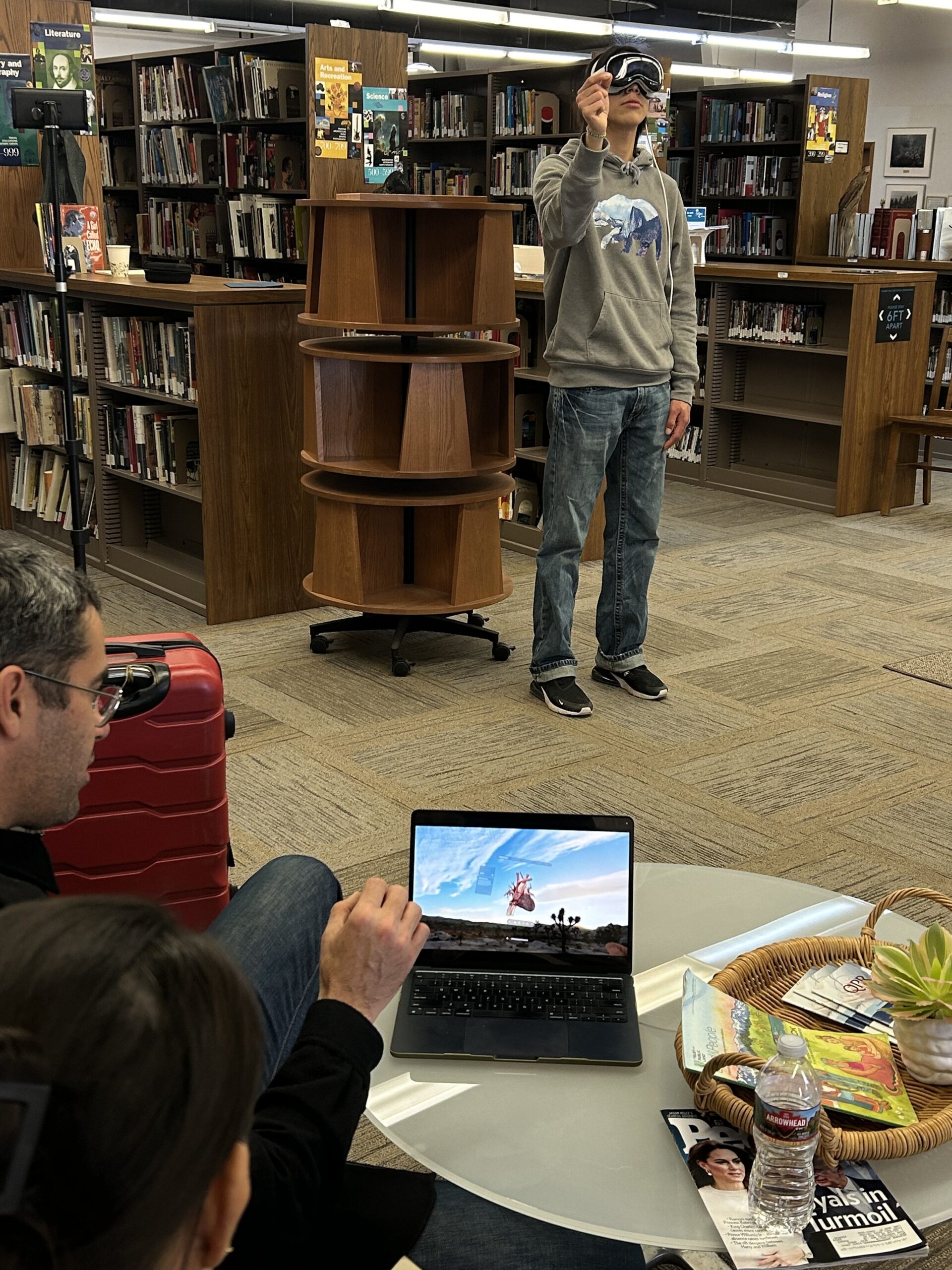Seeking immortality – Chief Dull Knife College recipient of MLIS Grant to preserve elder stories, language, and artifacts online

Student testing out the VR at Chief Dull Knife College. It is active firsthand learning – making things real. A new twist on technology.
LAME DEER, Mont. – Chief Dull Knife College Library received an Institute of Museum and Library Services (IMLS) grant to preserve Cheyenne history, elders’ stories, and artifacts via Virtual Reality (VR). It is called the Seeking Immortality Project.
In the old way, the Cheyenne did not need computers to do that. We do it by remembering people through stories – oral tradition. Why do we recall Sweet Medicine, our prophet? And why do we know about our grandfathers and grandmothers?
We learn these traditions and knowledge through storytelling.
Yet, there might come a day when no one remembers or tells these stories, overpowered by television or the internet, which are far more intriguing to our young ones.
- What is that? According to experts, it is the process of recording people, stories, and memories in a way that makes them appear alive. A VR is a digital landscape for Northern Cheyenne to share their cultural practices and language. In many ways, VR spaces are like contemporary video games but are more interactive. They can provide active firsthand learning – making things real. A new twist on technology – the goal being to preserve things into the future so that future generations can access this form of learning.
In collaboration with San Jose State University, in California, CDKC will begin recording elder stories at Northern Cheyenne. “This project is exciting because it’s allowing us to use technology to further document our current history and use of the Cheyenne language,” explains CDKC Linguist and Cheyenne Language Instructor Rosalia Bad Horse.
“Libraries are a place for sharing knowledge, and this gives us a way to share Cheyenne knowledge with Cheyenne people,” said Adrienne Violet, CDKC Librarian. “There are many ways for community members to participate. All they need to do is ask.”
Therein lies the challenge.
Traditional Cheyenne do not seek acknowledgment. Instead, they have been trained to “stand in the back” and wait to be called upon.
The project is a partnership with San Jose State University, funded by the Native American Enhancement Grant, funded by the Institute of Library and Museum Services, the largest organization in the world dedicated to cultural preservation.
Dr. Anthony Chow, director of the SJSU iSchool, offers a distinct viewpoint shaped by his diverse heritage, blending his Chinese roots with a traditional southern upbringing in the deep south. As a member of a minority group, he shares a profound connection with the Cheyenne community, enriching his comprehension and respect for their culture. Having faced adversity in his youth, he found solace and empowerment through athletics, a journey shared by many Native Americans. This transformative experience fueled his dedication to education and advocacy for marginalized communities, fostering his commitment to uplift both his heritage and that of others. “Many of us are still strong in who we are despite the low expectations of others,” he remarked.
The pilot project aims to preserve certain aspects of Cheyenne’s history permanently. That involves several layers of preservation: 1) physical evidence such as papers, the actual artifacts; 2) videotapes or other recordings; 3) training people at the college to maintain and protect those objects; 4) providing proper storage on a local basis, and 5) to send this information to the cloud which is somewhere on a satellite in space.
One example of the project activities is to record Senator Ben Nighthorse Campbell, Northern Cheyenne, an internationally famous jeweler who crafted and donated a precious buffalo skull to Chief Dull Knife College, hoping it would remind young people about the Sun Dance and the significance of being a Northern Cheyenne. Hopefully, a virtual replica of the unique skull will be available for future generations, as well as Ben’s voice and face relating to the tale.
Why is this project important?
“What,” Dr. Chow proposed, “if there was a big flood or fire at CDKC, destroying physical evidence? As a result of this project, that memory would still be available on the cloud.
How to get to the cloud is mysterious to the average Cheyenne, especially elders who will be starred there.
“There will always be young people who know how to click the right buttons on cell phones and computers to get to it and see and hear from elders they may never have a chance to meet otherwise,” Chow explained.
An informational booth about the Seeking Immortality Project will be presented at the annual 4th of July Northern Cheyenne Pow Wow. Filming and recording will then begin shortly. For more information, contact Adrianne Viollet, CDKC Library at 406-477-6215.
Another goal of the pilot project is to encourage other Tribes to consider similar endeavors.
(Contact Clara Caufield at 2ndcheyennevoice@gmail.com)
The post Seeking immortality – Chief Dull Knife College recipient of MLIS Grant to preserve elder stories, language, and artifacts online first appeared on Native Sun News Today.
Tags: Top News
